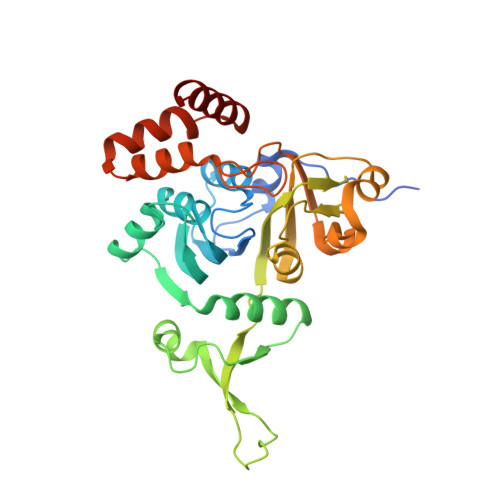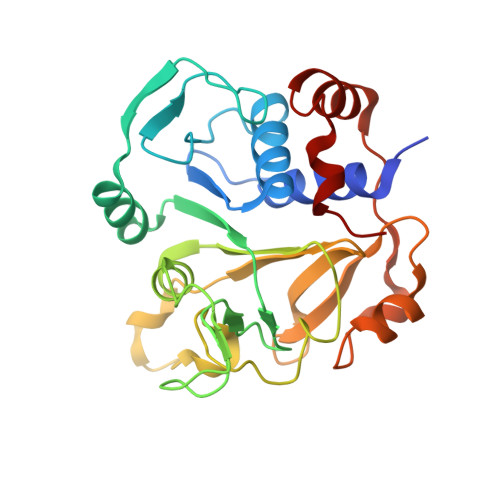IpdAB, a virulence factor inMycobacterium tuberculosis, is a cholesterol ring-cleaving hydrolase.
Crowe, A.M., Workman, S.D., Watanabe, N., Worrall, L.J., Strynadka, N.C.J., Eltis, L.D.(2018) Proc Natl Acad Sci U S A 115: E3378-E3387
- PubMed: 29581275
- DOI: https://doi.org/10.1073/pnas.1717015115
- Primary Citation of Related Structures:
6CO6, 6CO9, 6COJ, 6CON - PubMed Abstract:
Mycobacterium tuberculosis ( Mtb ) grows on host-derived cholesterol during infection. IpdAB, found in all steroid-degrading bacteria and a determinant of pathogenicity, has been implicated in the hydrolysis of the last steroid ring. Phylogenetic analyses revealed that IpdAB orthologs form a clade of CoA transferases (CoTs). In a coupled assay with a thiolase, IpdAB transformed the cholesterol catabolite ( R )-2-(2-carboxyethyl)-3-methyl-6-oxocyclohex-1-ene-1-carboxyl-CoA (COCHEA-CoA) and CoASH to 4-methyl-5-oxo-octanedioyl-CoA (MOODA-CoA) and acetyl-CoA with high specificity ( k cat / K m = 5.8 ± 0.8 × 10 4 M -1 ⋅s -1 ). The structure of MOODA-CoA was consistent with IpdAB hydrolyzing COCHEA-CoA to a β-keto-thioester, a thiolase substrate. Contrary to characterized CoTs, IpdAB exhibited no activity toward small CoA thioesters. Further, IpdAB lacks the catalytic glutamate residue that is conserved in the β-subunit of characterized CoTs and a glutamyl-CoA intermediate was not trapped during turnover. By contrast, Glu105 A , conserved in the α-subunit of IpdAB, was essential for catalysis. A crystal structure of the IpdAB·COCHEA-CoA complex, solved to 1.4 Å, revealed that Glu105 A is positioned to act as a catalytic base. Upon titration with COCHEA-CoA, the E105A A variant accumulated a yellow-colored species (λ max = 310 nm; K d = 0.4 ± 0.2 μM) typical of β-keto enolates. In the presence of D 2 O, IpdAB catalyzed the deuteration of COCHEA-CoA adjacent to the hydroxylation site at rates consistent with k cat Based on these data and additional IpdAB variants, we propose a retro-Claisen condensation-like mechanism for the IpdAB-mediated hydrolysis of COCHEA-CoA. This study expands the range of known reactions catalyzed by the CoT superfamily and provides mechanistic insight into an important determinant of Mtb pathogenesis.
- Department of Biochemistry and Molecular Biology, Life Sciences Institute, The University of British Columbia, Vancouver, BC, Canada, V6T 1Z3.
Organizational Affiliation:



















